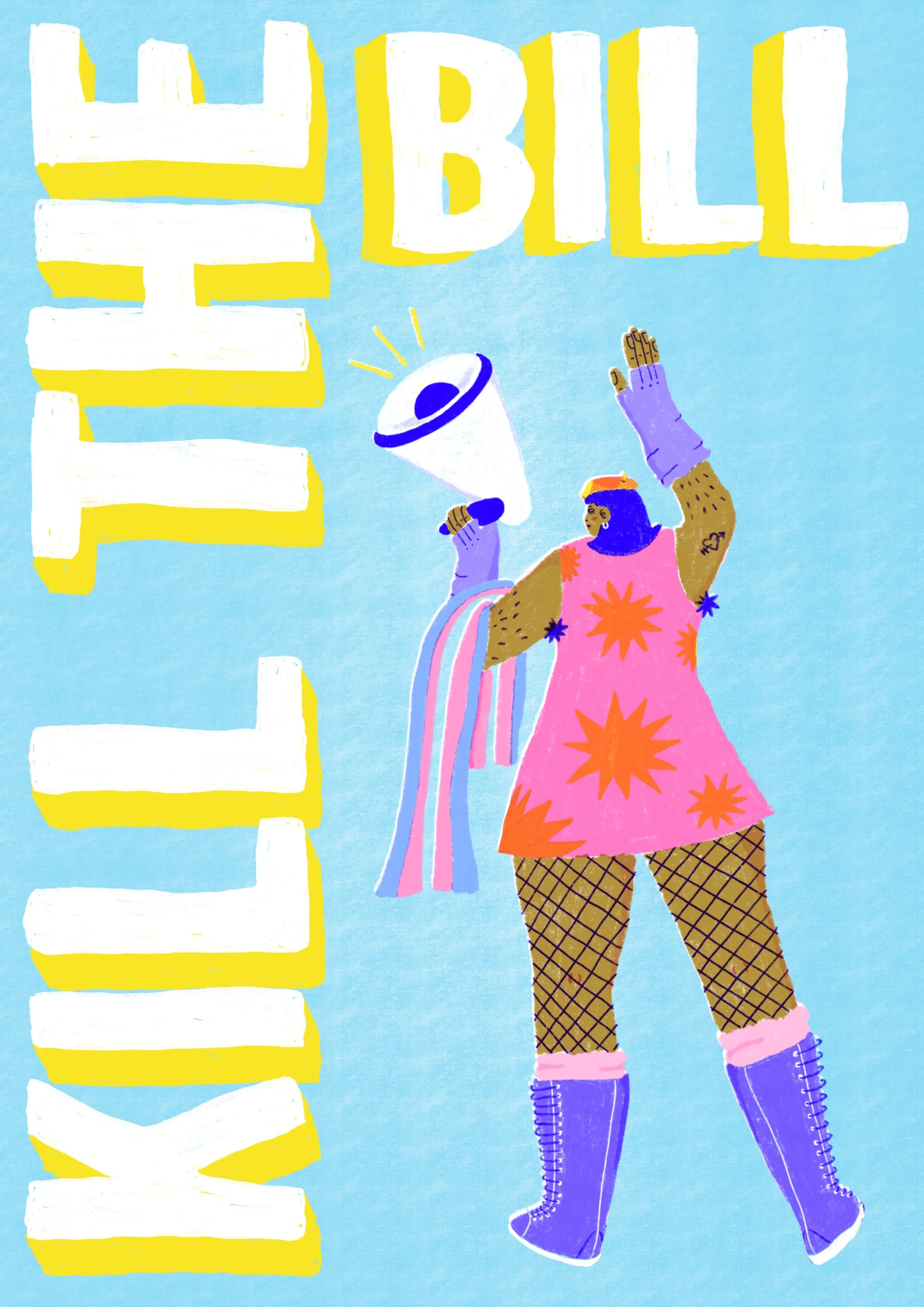Here’s Why British Protesters Want to “Kill the Bill”
On 18 March, Sisters Uncut gathered women and allies from all over the country under the rallying cry #KilltheBill for an online public meeting featuring speakers from Black Lives Matter, Traveller Pride, No More Exclusions, SWARM and Disability Justice.
What is Sisters Uncut?
Sisters Uncut was established by domestic violence survivors and sector workers to defend domestic violence services from austerity cuts. Since its birth in 2014, it has grown into a mass movement across the UK.
Now, Sisters Uncut exists as a non-hierarchical direct action group formed of non-binary people and women who are renowned for bold protest tactics, such as jumping on the red carpet at the ‘Suffragette’ premiere and dying the Trafalgar Square fountains red.
When women were brutalised by police at a Sarah Everard vigil on 13 March, Sisters Uncut organised five consecutive days of action, joining forces with Black Lives Matter and other crucial British organisations to speak out against state violence towards marginalised people.
Why #KilltheBill?
When Sisters Uncut say #KilltheBill, it’s in response to the new Policing, Crime, Sentencing, and Courts (PCSC) Bill introduced to Parliament on 9 March.
The draconian legislation of the PCSC Bill has caused widespread outrage – and rightly so. It gives the Home Secretary the power to choose which protests are legitimate, and increases the maximum penalty for criminal damage of a memorial from 3 months to 10 years.
The Bill follows Priti Patel’s criticism of Extinction Rebellion and the hugely important Black Lives Matter demonstrations of last year, during which protesters toppled the statue of slave trader Edward Coulston in Bristol.
Paul Heron from Public Interest Law Centre has warned of clauses within the Bill that “strengthen police powers to tackle non-violent protests that have a significant disruptive effect on the public or on access to Parliament.” These clauses strip protests of their power, and strip the public of the freedom to challenge the state.
Of course, we believe that protests should be peaceful, and we certainly don't condone violence. But, by nature, protesting must be disruptive. When people protest, they do so in response to extreme injustice, to demand that marginalised voices be heard. The criminalisation of disruptive protests seriously undermines any semblance of democracy that exists in the UK.
Hearing from speakers at #KilltheBill, it’s clear that the PCSC Bill threatens not only our freedom of speech, but also the safety of sex workers, survivors, disabled people, and Black and minority ethnic people.
A speaker from Traveller Pride called out the systemic racism within the police towards the Gypsy, Romany and Traveller (GRT) community – which already permits the state to carry out violence, seize property, and refuse healthcare to GRT people without repercussions. If the new Bill isn’t stopped, clauses relating to trespassing could further endanger this community, causing homelessness and more violence.
Meanwhile, a labour MP has said they’ll introduce amendments to the Bill that will criminalise clients of sex workers. According to Decrim Now, this kind of legislation is proven to cause unsafe environments for sex workers and gives them no recourse to worker’s rights. One speaker from Sex Workers Advocacy and Resistance Movement (SWARM) commented:
“For many of us the biggest of experience of violence we’ve had in the sex industry has been at the hands of the police, who are rapists; who are agents of the state and of immigration; who seize our earnings and close our work places and force us to work alone.”
With 1,563 deaths during or following police contact in England and Wales since 1990, it’s clear that there’s still a huge problem with police violence in the UK. Increasing police presence in the lives of vulnerable people does nothing to protect them. In fact, people of Black, Asian and minority ethnic backgrounds are disproportionately at risk of dying in police custody in England and Wales.
What happens next?
Protesting is one of the few ways that we can truly make ourselves heard. We know from everything that has been achieved by the suffragettes, the LGTBQ+ movement, and Black Lives Matter (to name just a few) how important it is that we protect our right to protest.
Though the Bill passed its second reading last week, the backlash and protesting has caused its progress in Parliament to be delayed until April. In response, Sisters Uncut has said: “this is the power of protest, and this is just the beginning. We are ready to fight the police powers Bill at every stage of parliament.”
If we’re to stop the Bill from being passed, we must continue to make it clear to the Home Secretary that we won’t tolerate her threatening our democratic freedom. Luckily, we’re not alone.
At the time of recording, the #KilltheBill meeting had over 4,000 attendees, and has since been viewed at least 16,000 times on Facebook. This response is a reassuring show of solidarity, and suggests that there is an active community of people who are willing to stand against injustice for British people.
If you want to add your voice to the fight, sign the petition to protect our freedom to protest. Check out the Sisters Uncut email template for writing to your MP to stop the Bill, and watch the #KilltheBill meeting livestream.
Title image by Rosa Kusabbi.





